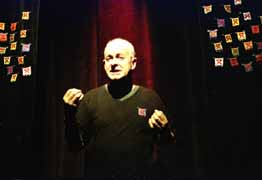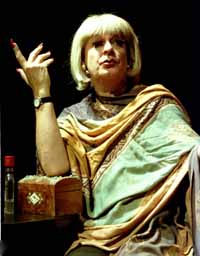
Randy Gener
Fear and Laughing (and Loathing) in South Africa
 |
| Peter-Dirk Uys in his one-man show "Foreign Aids", at La MaMA E.T.C |
"Foreign Aids" by Pieter-Dirk Uys
October 23 to November 9
La MaMa E.T.C (The Club),
74A East Fourth Street
Presented by La MaMa E.T.C.
Th-Sat at 10pm, 5:30pm Sun,
$15 or $12 members/tdf Box office (212) 475-7710. Online
ticketing available at www.lamama.org
Reviewed by Randy Gener
In "Foreign Aids"--Pieter-Dirk Uys's angry new solo performance at The Club at La MaMa E.T.C.--South Africa's favorite court jester morphs into some sort of rabid attack dog. Wiping the powder off his face, putting aside the frowzy dress and too-high heels, Uys turns around to erupt with scorn and anger. He fulminates against what he believes to be the genocide being perpetrated by South African president Thabo Mbeki and its health minister Dr. Manto Tshabalala-Msimang because of their complacent stance towards AIDS, which is killing millions of his countrymen.
"In South Africa, our war on terror is the war on AIDS," Uys says. "George Bush isn't going to lose any sleep over black people dying. As South Africans, we have to help ourselves."
In newspapers and public forums, Mbeki has been condemned internationally for asserting that HIV does not lead to AIDS and that he personally knew no one who had died of AIDS-related causes. Mbeki has also been slammed for his administration's inadequate HIV/AIDS awareness and prevention programs. "The weapon of mass destruction is in South Africa and being harbored by the South African president and his minister of health-it is HIV/AIDS," Uys cries out, his eyes flaring.
Uys's current one-man outing is lights years away from his last New York City appearance, some seven or eight years ago, when he performed "You ANC Nothing Yet" at the Brooklyn Academy of Music. In that hilarious show, he gleefully trotted out one of his many onstage alter ego, the very saccharine and very conservative Mrs. Evita Bezuidenhout. Dubbed "the most famous white woman in South Africa" (until she promptly did assume it), Evita is a beloved persona through whom Uys mocks and lampoons the worst aspects of racism, prejudice and discrimination during the height of apartheid. An Afrikaner amalgam of Margaret Thatcher, Miss Piggy and Pauline Hanson, Evita makes a brief appearance at the start of "Foreign Aids," too. But it soon becomes clear that Evita's monologue, in which she disavows any personal stake in South Africa's AIDS crisis (including that of her HIV-positive son), is meant mainly as a transitional phase into Uys's reemergence as a post-apartheid activist. And she never appears again.
"Foreign Aids" might be re-titled "Pieter-Dirk Uys Unplugged." A master of ice-pick-like satire, Uys jabs and stabs at the complex dynamic of fear, hypocrisy, ignorance, neglect and smugness that, he reports, surrounds Africa's AIDS crisis. In the show Uys unloads a searing repertoire of political innuendo, sexual puns, social caricatures, frank talk, current-events references and devious associations. ("Thabo," for those who play Scrabble, might be an anagram for "Botha," Evita quips.) Uys gives us a personal tour of the attitudes, issues and concerns that are permeating in both the white and black South African communities.
And that tour is often in-your-face. Uys hasn't quite given up on performing outrageous characters. Aside from Evita, he quickly assumes the guises of Dr. Thaboo MacBeki (any resemblance to the South African President Thabo Mbeki is entirely intentional), PW Botha and former president Nelson Mandela. Uys even finds time to debut a brand new character, the ex-stripper Bambi Kellerman, Evita's younger sister who believes that "racism is easier to catch than AIDS."
But the heart of "Foreign Aids" lies in between these sundry characters. Uys takes off the funny faces, the eyelashes and colorful costumes, tucking it all away in his two paper bags, so he can tell, in a plain black outfit and without makeup, some sobering stories from the frontline of the crisis. Uys talks about schools that refuse to install condom-dispensing machines because they don't want to encourage sex. He attacks the urban legend that raping a virgin cures the disease. He exposes the absurdities of a government-led program to hand out free condoms that have been dutifully stapled, in the center, to instruction leaflets. He says that for the past several years he has been on the road, driving to impoverish schools and communities to spread the message of safe sex and AIDS awareness. And we hear of unimpressed parents and censorious school officials who express their unhappiness and dismay at Uys's activities.
Uys's AIDS-awareness travels are all done without any government funding or corporate sponsorship. And that huge disconnect--between what is really happening at the grassroots level, and what a negligent government in denial has been trying to keep wrapped up--is the well-spring of much of the poignancy, sharp protest, sly critique, and riotous humor in "Foreign Aids." Uys is an amazing performer, and this is a sidesplitting but devastating show. Though it is very entertaining, there are moments of high, passionate indignation that rise to the rage of a Cassandra.
 |
| Pieter-Dirk Uys as Bambi Kellerman--even in drag, he's got real teeth. |
In fact, the caustic, truth-telling spirit of "Foreign Aids" is closer to that of Larry Kramer than Barry Humphreys, with whom Uys is often compared. Most American audiences who might want to see the show would have probably heard that Mrs Evita Bezuidenhout is South Africa's answer to Humphreys's Dame Edna Everage. It is an odd, utterly wrong-headed comparison, to which Uys cannily retorts, "But what exactly is the question?"
Nevertheless, Americans are suckers for shows featuring guys camping it up in a dress. One should never underestimate the box-office draw of a drag queen, and the postcards, which feature Uys pursing his lips with a crown and a wig, will certainly draw a certain kind of audience. But what gays and lesbians, and many drag-curious straight folks, will be surprised to encounter in "Foreign Aids" is the sort of drag show that has real teeth.
At times, Uys is so powerful and potent on his own that one feels a sigh of great relief when he actually puts on a dress. For a brief while, the dressing up allows for a comic distancing effect that allows us to get our bearings back. This happens, most happily, when Uys puts on the long red nails and the wig for Bambie Kellermann midway in the show. The widow of a high-ranking Nazi who has worked the sex shows of Europe, Bambie intersperses her comments about her husband's old circle of friends with her own observations on the current viral holocaust. But soon, the comic relief that Bambie engenders dissipates when she speculates, quite flippantly, that the First World's slowness in helping tackle South Africa's problem may be motivated by a subconscious desire to treat AIDS as a cull to get rid of blacks in the Third World.
In "Foreign Aids," Uys will not let us off the hook. And most of all, he will not let up so easily. No wonder the South African government's response to Uys's scathing criticisms has been equally sharp and severe. Early in October, a minister, Essop Pahad, put Uys down as a "house clown." An African National Congress spokesperson Smuts Ngonyama circulated a party response which states that "real life is not satire" and that "the country is not amused by [Uys's] grandiose posturing and attention-seeking comments that do not add any value whatsoever to nation-building. His comments are rather self-serving and belie a malicious agenda that does not have the interests of the nation or the country." The name-calling continues in "Foreign Aids," as Uys refers to President Mbeki as "Comrade Undertaker," adding: "He lies and so condemns his nation to death."
One hopes that Uys will not be turned into a scapegoat in the political mess concerning the AIDS pandemic, for real lives (not reputations) are at stake here. (According to one statistic, about 10 per cent of South Africa's 42 million population is HIV-positive, with 7 million expected to be dying from the disease by 2010.) And "Foreign Aids," at its weakest, feels like a consciousness-raising session. But in a sense, South Africa now finds itself at that same place America found itself in the late 1980s, during the height of the AIDS deaths.
So Uys's decision in "Foreign Aids" to spend less time in drag and more time portraying himself (a white, 57-year-old gay man telling predominantly black schoolchildren about safe sex) is itself a red flag. "Foreign Aids" serves as a bitter comic's warning to the rest of the world of our common enemy--AIDS. "If just one child remembers something that will save his life, that's got to be worth it," Uys say, and he truly believes it in a way that should put Thabo Mbeki and the African National Congress to the deepest shame.
In "Foreign Aids," Pieter-Dirk Uys transcends drag. There was a time, not so long ago, when a man in a dress "did have useful influence on enlightenment in the days when there was a total absence of democracy in South Africa," as the South African government itself has confessed. And today, when there is an absence of compassion and common sense, Uys absolutely has the right to "act up."
[Gener]
Randy Gener, critic-at-large for The New York Theatre Wire, has written
and directed his own plays, including "Wait for Me at the Bottom of the
Pool" and "Love Seats for Virginia Woolf."

| home | discounts |
welcome |
| museums | recordings |coupons |
classified |